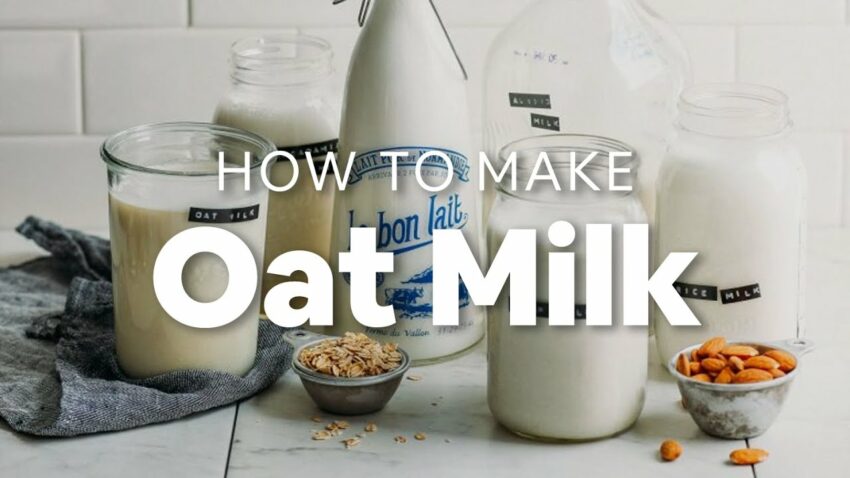Understanding Oat Milk
What is Oat Milk?
Oat milk is a non-dairy milk alternative made from oats and water. It is created by blending oats with water, then straining the mixture to remove solid particles, resulting in a smooth, creamy liquid that resembles cow’s milk in texture and appearance.
How is Oat Milk Made?
Making oat milk at home is a straightforward process that requires minimal ingredients and equipment:
Ingredients
Rolled oats (preferably organic)
Water
Optional sweeteners or flavorings such as vanilla extract or dates
Instructions
Add one part rolled oats to two parts water in a blender.
Blend on high speed for 30-60 seconds until the oats are fully broken down and the mixture is smooth.
Strain the mixture through a fine mesh sieve, nut milk bag, or cheesecloth to remove any solid particles.
Optional: Add sweeteners or flavorings to taste, such as maple syrup, honey, or cinnamon.
Store the oat milk in a sealed container in the refrigerator for up to five days.
Nutrition and Benefits of Oat Milk
Nutritional Profile
Oat milk is naturally rich in nutrients and provides several health benefits:
Protein
Oat milk contains more protein than almond milk and rice milk, making it a suitable option for individuals looking to increase their protein intake.
Fiber
Oats are a good source of dietary fiber, including both soluble and insoluble fiber, which supports digestive health and promotes feelings of fullness.
Vitamins and Minerals
Oat milk is fortified with essential vitamins and minerals, including calcium, vitamin D, vitamin A, and vitamin B12, to provide similar nutritional value to cow’s milk.
Heart Health Benefits
Consuming oat milk may offer several heart health benefits:
Lower Cholesterol Levels
Oats contain beta-glucans, a type of soluble fiber that has been shown to reduce LDL cholesterol levels and improve heart health.
Blood Pressure Regulation
The potassium content of oats may help regulate blood pressure and reduce the risk of hypertension.
Dairy-Free and Vegan Alternative
Oat milk is an excellent dairy-free and vegan alternative to cow’s milk for individuals with lactose intolerance, dairy allergies, or those following a plant-based diet.
Sustainable and Environmentally Friendly
Compared to dairy milk, oat milk has a lower environmental impact, requiring less water and land to produce. Additionally, oats are often grown using sustainable farming practices, making oat milk a more eco-friendly choice.
FAQs About Oat Milk
Is oat milk suitable for individuals with gluten intolerance or celiac disease?
While oats are naturally gluten-free, they may come into contact with gluten-containing grains during processing. Individuals with gluten intolerance or celiac disease should choose certified gluten-free oat milk to avoid potential cross-contamination.
Can oat milk be used as a substitute for cow’s milk in recipes?
Yes, oat milk can be used as a substitute for cow’s milk in most recipes, including baking, cooking, and beverages. It has a similar texture and flavor to cow’s milk, making it a versatile option for various culinary applications.
Is oat milk higher in carbohydrates compared to other non-dairy milk alternatives?
Oat milk typically contains more carbohydrates than some other non-dairy milk alternatives such as almond milk or coconut milk, primarily due to its oat content. However, it is still lower in carbohydrates than cow’s milk and can be included in a balanced diet.
What is the difference between store-bought oat milk and homemade oat milk?
Store-bought oat milk may contain additional ingredients such as stabilizers, emulsifiers, and sweeteners to improve shelf life and flavor. Homemade oat milk allows you to control the ingredients and customize the flavor and sweetness according to your preferences.
Can oat milk be used as a coffee creamer?
Yes, oat milk can be used as a coffee creamer to add creaminess and flavor to your morning brew. It froths well and creates a creamy texture similar to cow’s milk, making it a popular choice among coffee enthusiasts.
Does oat milk contain naturally occurring sugars?
Yes, oats contain naturally occurring sugars, primarily in the form of starch. However, the amount of sugar in oat milk can vary depending on the brand and any added sweeteners or flavorings.
Is oat milk suitable for infants and young children?
Oat milk is not recommended as a primary source of nutrition for infants and young children, as it may not provide all the essential nutrients they need for healthy growth and development. Consult with a pediatrician before introducing oat milk to infants or young children.
Conclusion
Oat milk is a nutritious and versatile dairy-free alternative to cow’s milk, offering several health benefits and culinary uses. Whether you choose to make oat milk at home or purchase it from the store, incorporating this plant-based milk into your diet can provide essential nutrients, promote heart health, and support a sustainable lifestyle. By understanding how to make oat milk, its nutrition profile, potential benefits, and common FAQs, you can enjoy the creamy texture and delicious flavor of oat milk while reaping its many health benefits.
- Neck Line Filler Treatment Near Ockley, Surrey - June 4, 2025
- What Is Pansexuality And How Does It Differ From Other Sexualities? - June 3, 2025
- Skin Treatment & Skincare Consultations Near Okewood, Surrey - June 2, 2025

